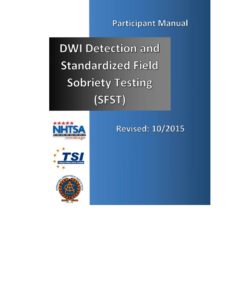One of the most common topics a Minnesota DUI Lawyer receives questions about is field sobriety testing. Clients approach the topic with the lore and wonderment suited for a magic show. This reverence is brought about by television shows, stories from friends, and anecdotes from uncles who’ve done more than their fair share of imbibing. Coincidentally, field sobriety tests do have some similarities with a good magic trick, but not in the way one might traditionally think about being “tricked” – more on that will come later in this article.
Many DUI defendants either have significant misconceptions about the purpose of field sobriety tests, or they’re just not sure how the tests will impact their case. For nuanced reasons, people who believe they’ve performed poorly on the tests actually have done quite well. Unfortunately, the opposite is sometimes true as well. Even more unfortunate, sometimes the client’s misconception is due to inaccurate information provided to them by another DUI lawyer. The only thing worse than being wrong, is paying a DUI lawyer to be wrong for you.
Which brings us to our list of facts our DUI lawyer wants you to know about field sobriety tests:
1. Any given DUI lawyer may not know much more than you do about field sobriety tests.
Unless your DWI lawyer has taken the time to study the National Highway Traffic Safety Administration (NHTSA) manual regarding standardized field sobriety tests, chances are you know nearly as much as he or she does. NHTSA periodically publishes new editions of a “participant manual” that is approximately 450 pages in length.
Every law enforcement officer trained in DUI detection utilizes that manual in their training. As you may have guessed, the 450 page manual describes in great detail how the field sobriety tests are to be administered and what officers should observe while administering the tests. Many DUI lawyers believe they can “eyeball” their clients on the field sobriety tests without looking critically at the evidence and assessing it in an analytical manner.
It is not enough for a DUI lawyer to rely on his or her experience alone in assessing their client’s performance on field sobriety tests, challenging the administration of the field sobriety tests, and arguing against any conclusions the prosecutor would like to draw from the tests. Your DUI lawyer must know the specific details about the various tests to explain why your performance was satisfactory and not indicative of impairment. If your DUI lawyer cannot provide that explanation, then all he or she is doing is providing an opinion – and anyone can do that. Would you rather your DUI lawyer to tell the prosecutor that your field sobriety tests weren’t indicative of impairment, or that they weren’t indicative of impairment because the Horizontal Gaze Nystagmus (HGN) test was administered incorrectly, improper instructions were given before the walk and turn test, and the emergency lights that the officer left on caused a visual distraction that impacted your performance on the test? Most would choose the latter, and they would be correct.
2. A good DUI lawyer knows the value of an officer’s conclusions depends upon their performance just as much as yours.
Field sobriety tests are standardized by NHTSA. Remember that 450 page manual discussed above? It has very strict and particular guidelines about how the tests are to be administered. If even one portion of a test is changed or omitted, the validity of the test is compromised. This can be used to your advantage in three distinct ways.
First, video of your field sobriety tests can be reviewed for errors by the law enforcement officer. Once an error or errors are identified, that video can be used in conjunction with the manual to prove any opinions drawn by the officer regarding your performance are compromised.
Second, the officer can be questioned about his knowledge of the test administration process during his testimony. If he is unable to remember all of the portions of the test, the correct instructions, or the criteria for what is required to determine an indicator of impairment, he can be confronted with the NHTSA manual to highlight his lack of knowledge. This lack of knowledge will greatly call into question his or her administration of the test in your particular case and will undermine any opinion that your performance indicated impairment. Even better, if he or she testifies contrary to what the NHTSA manual requires, then there is little question that his opinions lack credibility.
Remember:
Turning the tables on the police officer, by systematically questioning him or her on the tests that he required of you, is extremely powerful evidence. If he did not administer the tests correctly, or could not recall the requirements of the tests during his testimony, his conclusions about your performance on those tests are questionable at best.
Third, with detailed knowledge about the NHTSA manual, your DUI lawyer can elicit favorable facts from an otherwise unfavorable witness. Each test has a list of “clues” for the officer to observe that are indicators of impairment. There are 6 clues for the HGN test, 8 clues for the walk and turn test, and 4 clues for the one legged stand test. In addition to calling into question any clues they claimed to observe, a good DUI lawyer can highlight the standardized clues or indicators of impairment that the officer did not observe.
3. The NHTSA manual trains officers how to testify.
NHTSA wants law enforcement officers to testify uniformly with certain objectives in mind. A good DUI lawyer will understand those objectives, anticipate the answers that will be provided accordingly, and be prepared to undermine their credibility. As discussed above, there is plenty of ammunition in that regard for the educated and prepared advocate.
4. Field sobriety tests are “divided attention” tasks.
Like a magician uses sleight of hand, officers administering field sobriety tests attempt to direct their suspect’s attention from what they are actually observing. Many people believe that field sobriety tests relate solely to a person’s physical performance, but much of what is being scrutinized by the officer is the person’s mental performance and ability to follow instructions. The officer will break apart test instructions by directing the person to stand in a particular manner, see if they are able to comply, then instruct the person to listen to the further instructions but to wait to begin the test until told, and then tell the person to start the test. NHTSA labels these tasks as “divided attention” tasks, but others may fairly characterize them as simply confusing. While the officer is not “tricking” the suspect in the traditional sense of word, he or she is certainly testing and observing the person’s cognitive ability in addition to their physical performance.
5. Numerous factors other than alcohol can impact a person’s performance.
The NHTSA manual recognizes a non-exclusive universe of factors that can impact a person’s performance on field sobriety tests, thereby calling into question the validity of the results of the tests. These factors include flashing lights, eyeglasses, footwear, physical injury, whether the person’s weight poses a hindrance, wind, dust, extreme weather, moving or distracting objects, and nearby traffic. NHTSA did not endeavor to identify all possible factors, and therefore any plausible explanation for deviating from the instructions of the field sobriety test should be explored by your DUI lawyer.
6. Only three field sobriety tests are purportedly reliable enough to be standardized by NHTSA.
Although there are many varieties of field sobriety tests, only three are recognized by NHTSA as reliable enough to draw valid conclusions about a person’s impairment.
The first standardized test is the Horizontal Gaze Nystagmus (HGN) test.
Horizontal relates to the motion of the eyes as directed by the law enforcement officer and nystagmus is an involuntary jerking of the eyes. Although there are various types of nystagmus caused by numerous circumstances, the test purports to determine whether a person’s blood alcohol concentration .08 or more if the officer observes four of six clues in a high percentage of cases. There are three clues for each eye: lack of smooth pursuit, distinct and sustained nystagmus at maximum deviation, and onset of nystagmus prior to 45 degrees. This test is often administered incorrectly by officer and is fraught with issues regarding interpretation.
The second standardized test is the walk and turn test.
The walk and turn test purports to determine whether a person’s blood alcohol concentration is .08 or more if the officer observes 2 of 8 total clues. The walk and turn test consists of an instructional phase where the person is told to remain in a starting position while listening to instructions, and a performance phase where they take nine heel-to-toe steps down a real or imaginary line, turn around with a series of small steps, and take nine heel-to-toe steps back, all while counting them out loud. The 8 clues are whether the person cannot keep his balance, starts the test too soon, stops while walking, does not touch heel to toe, steps off the line, uses their arms to balance, performs an improper turn, and takes an incorrect number of steps. There will often be discrepancies in the imaginary line envisioned by the driver and the officer, questions of interpretation regarding the person using their arms for balance or not, whether the turn was according to instructions, and whether the officer instructed the test correctly. Other considerations regarding performance include the characteristics of the roadway and footwear of the driver.
The third standardized test is the one legged stand test.
The one legged stand test purports to determine whether a person’s blood alcohol concentration is .08 or more if the officer observes 2 of 4 total clues. The test consists of the person raising his leg off the ground while counting seconds by “one-thousands.” The 4 clues are whether the person sways while balancing, uses their arms to balance, hopping, and putting their foot down. The first two clues are often ripe for disagreement between reasonable people. Also, officers often mistakenly determine that a person that stops counting before told is assessed a clue, but it is not one.
Field sobriety tests that are not standardized including reciting the alphabet backwards, counting backwards, finger to nose, and the Rhomberg balance test.
Field sobriety tests and the testimony pertaining to them can have a critical impact on your DUI case. It is important to equip yourself with knowledge about the tests and it is even more important for your DUI lawyer. If you’re facing a DUI charge, remember the facts discussed in this article:
- Any given DUI lawyer may not know much more than you do about field sobriety tests. Don’t settle for generic answers about field sobriety tests; make sure your DUI lawyer understands the tests more than superficially.
- A good DUI lawyer knows the value of an officer’s conclusions depends upon their performance just as much as yours. Your DUI lawyer can use their mistakes and lack of knowledge against them and highlight the positive aspects of your performance.
- The NHTSA manual trains officers how to testify. Your DUI lawyer should read the manual to know what they’re going to say before they say it.
- Field sobriety tests are “divided attention” tasks. Your DUI lawyer should assess both your physical and mental performance on the tests.
- Numerous factors other than alcohol can impact a person’s performance. You and your DUI lawyer should consider what those factors may be in your case.
- Only three field sobriety tests are purportedly reliable enough to be standardized by NHTSA. Standardized or not, there is plenty for a DUI lawyer to review to assess any conclusions drawn by the officer.
Our DUI Lawyers Are Passionate About Defending You – Give Them A Call Today
Lundgren & Johnson takes pride in its reputation for client service, positive case outcomes, and skilled advocacy. Our case results, testimonials, and client reviews are a testament to that. Attorneys Adam T. Johnson and David R. Lundgren can provide you knowledgeable, detailed, and a skilled defense if you’re facing DUI charges. If you’re interested in discussing your case with one of our lawyers, call 612-767-9643 to schedule your free consultation – we are available 24 hours a day, 7 days a week.





